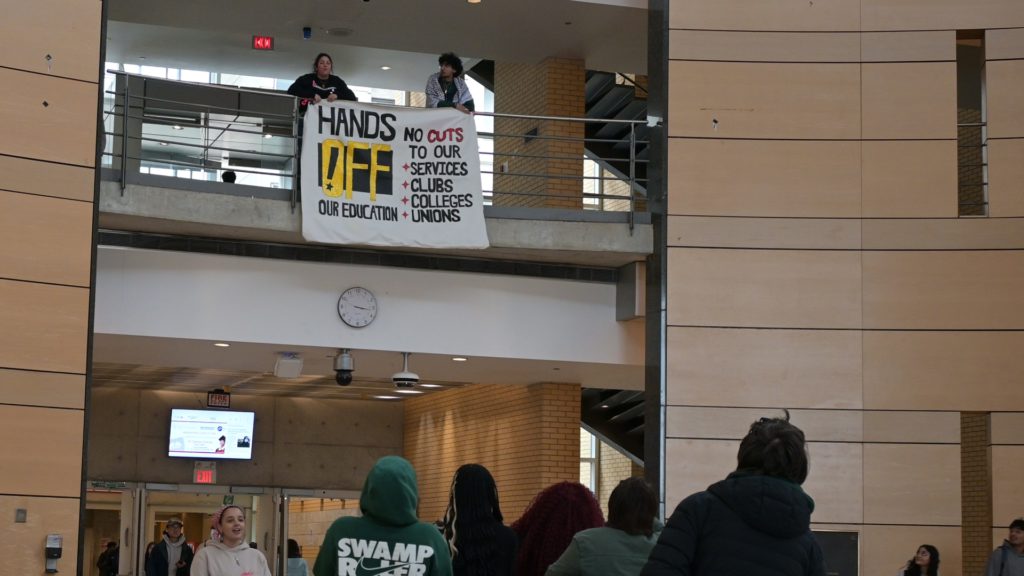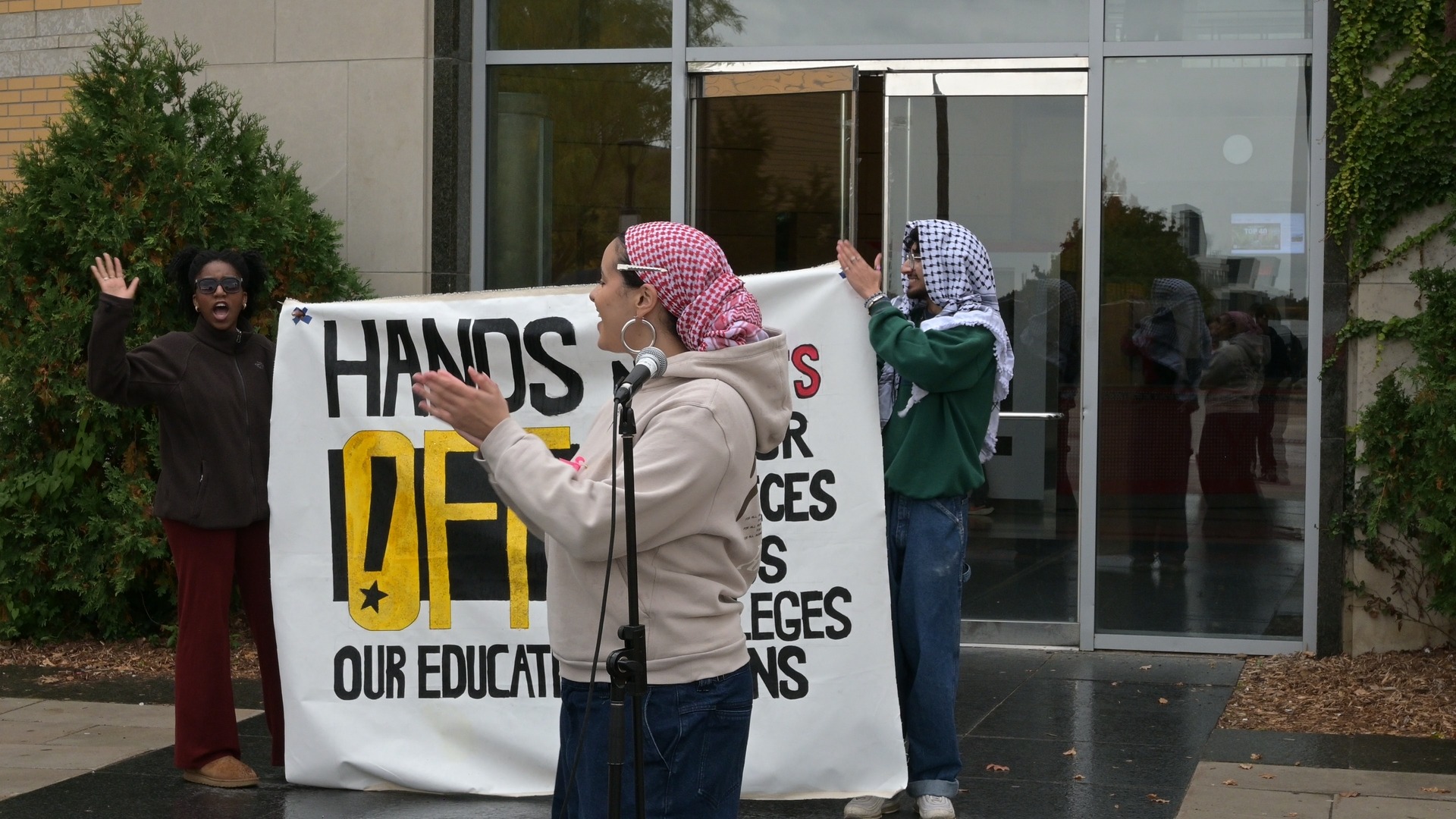“Education is a right, not just for the rich and white.”
This chant, authored by YFS President Somar Abuaziza, was one among many voiced by a small but impassioned crowd of students, staff, and faculty standing just outside of Vari Hall.
From 2 p.m. to 3 p.m. on Oct. 22, the YFS ran their Hands Off Our Education! press conference as part of the Canadian Federation of Students–Ontario’s (CFS–O) province-wide week of action against the Ford government’s proposed Bill 33. The conference lineup consisted of 10 guest speakers, each detailing the negative impacts of the proposed bill on their respective organizations.
The controversial Bill 33, otherwise known as the Supporting Children and Students Act, had its first reading on May 29, 2025. While parliamentary discussions of the bill have largely focused on elementary and secondary schools, pertinent to the majority of the event’s speakers are its proposed amendments to the Ministry of Training, Colleges, and Universities Act. One of the suggested additions would require colleges and universities to use and publicly disclose merit-based admissions criteria that would then be regulated by the Lieutenant Governor of Ontario. Regulation would also be introduced to ancillary fees that are charged to postsecondary students.
York University’s Chief of Government and Community Relations & Protocol, Ijade Maxwell Rodrigues, provided Excalibur with an official statement regarding the bill. Rodrigues explained that though the university “acknowledges the Government of Ontario’s intent to enhance transparency and accountability in the postsecondary sector,” they hold concerns over the legislation’s current wording. These concerns are shared with the Council of Ontario Universities, which believes that the provincial government is interfering in areas that already have “well-established and rigorous systems.”
Rodrigues specifically stated that “changes to admissions or ancillary fee structures must be carefully evaluated to ensure they do not unintentionally harm equity-deserving students, reduce access, or impact the delivery of essential support services.” Rather than increase regulation, York urges the government to “prioritize sustainable funding and expanded enrolment capacity.”
Calumet College Council (CCC) President, Anaum Iqbal, delivered a speech that spotlighted Bill 33’s potential negative impacts on campus life. She provided Calumet’s reading week trip to Montréal as a recent example of exactly how these student levies are employed. If levies get cut to the point where student-run initiatives are compromised, Iqbal proposed, “is York going to call all the hotels in downtown Montréal to get the cheapest prices available?” “York’s not going to do that,” she hammered in, “the students do that with the money that we get from our levies.”
Susanna, a member of the Ontario People’s Interest Research Group at York University (OPIRG York), addressed the York administration’s ongoing dissolution of community-organized services, such as the Sexual Assault Survivor’s Support Line & Leadership and the Centre for Women and Trans People.
“Student freedom and autonomy is facing its biggest crisis yet,” she proclaimed. OPIRG York is levy-funded and fosters numerous student-led action groups, including the Palestine Solidarity Collective. “This is for us and by us, and that is what they are trying to take away from us,” Susanna concluded.
These ideas of marginalized identities being the first to fall under attack were echoed by three representatives of the Indigenous Students’ Association at York (ISAY). President Rainingbird Daniels, Vice President Shallin Scott, and Treasurer Doreen Scow each spoke to the necessity of autonomous student organizations in ensuring goals of diversity and inclusion are met. “If our students aren’t here, then there is literally no programming or events for Indigenous students who are on campus,” Daniels stated. In the wake of York attempting to suspend enrolment for the Indigenous Studies program earlier this year, Daniels’s words seem especially relevant.
VP Internal for the York University Graduate Students’ Association (YUGSA), Shantanu Mehra, delivered an engaging dressing-down of the bill. “We are not a row or column in the balance sheet of the provincial government [where] they can just move us around so that at the end of the financial year, their profits are in place. The university is not a space for that, and we are not that,” he exclaimed. Mehra raised concerns over how the bill may decrease the available services for international students, which make up nearly 20 per cent of York’s student body.
Representatives for CUPE 3903 and YUSA, two of the University’s employee unions, elaborated on how the bill will impact York’s staff. To close off the speeches, Andrea Vásquez Jiménez, director of Policing-Free Schools, provided attendees with a perspective on the bill’s potential impacts outside of the postsecondary sphere.
The event concluded with the crowd being led into Vari Hall for a banner drop, where Abuaziza led a final series of chants.

After the event, Excalibur spoke to CFS–O Chairperson, Cyrielle Ngeleka, who elaborated further on her press conference speech. “It isn’t the first time that we’re seeing attacks of this magnitude. There was the Student Choice Initiative back in 2019 and 2021, and it was deemed unlawful both times. Bill 33, again, is just part of that same [anti-education] playbook,” she remarked. While Ngeleka has been travelling to various Ontario postsecondaries as part of her CFS–O duties, the press conference hit particularly close to home. “I’m a student here, so it’s really hard to come here in this capacity. But it’s really, really good to see that people are showing up, that people are talking about the Bill and understanding the repercussions of it.”
Shahzeb Saleem, part of CCC’s Promotions Committee, provided supplementary information on Iqbal’s speech. Left unmentioned by Iqbal was the CCC’s donation to York’s Muslim Student Association to assist in giving out food during Ramadan, which Saleem knows, “means a lot [to] her.”
In regards to the rally, Saleem added, “Levy fees help a lot for students to grow…and hearing that Doug Ford wants to take down [these fees] — it’s completely disgusting.” Saleem was pleased with the event’s turnout, having recognized students from a variety of York’s colleges. “Genuinely building a community, and letting people know that what Doug Ford is doing is illegal, it’s truly amazing,” he concluded.
YFS Faculty of Education representative, Danyeah Downie, held similarly positive views. “It was invigorating, very intense, and passionate,” she reflected. Downie hopes to become a teacher and holds concerns about how the bill will affect both her current education as well as career plans, stating that, “it’s just worrying to hear how things are going for the future, and I feel it’s very important to talk about.” Downie also perceives a culture of “political apathy” on campus, but optimistically believes that “through fighting for this, raising our voices, and trying to incite change…good things will happen.”
Symone Lennon, YFS VP of Campaigns and Advocacy, was the primary coordinator and emcee of the press conference. From her perspective, the event went “pretty well,” and she thought that “a lot of people learned about [Bill 33] today, which was really good.”
With the second reading of Bill 33 inconclusively adjourned, its rate and path of progression are unclear. Lennon believes that the bill’s passing would not mark the end of the battle, stating that the YFS is “hoping to fight against it to get it repealed.”
While the next major YFS-coordinated event for this campaign will likely be in the winter semester, Lennon suggested measures for students that want to contribute in the meantime. “A great way to take action is to email your MPP,” Lennon offered, which she said the YFS has made easier by linking a mailing tool in their Instagram bio.
Although the next reading of Bill 33 has yet to be scheduled, many students at York and across Ontario remain firm in their opposition.




